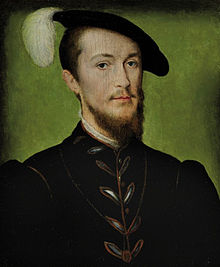Jean IV de Brosse | |
|---|---|
| Comte de Penthièvre Duc d'Étampes Duc de Chevreuse | |
 Portrait by Corneille de Lyon | |
| Born | 1505 Lamballe, Brittany, France |
| Died | 1565 (aged 59–60) |
| Noble family | Brosse |
| Spouse(s) | Anne de Pisseleu d'Heilly |
| Father | René de Brosse |
| Mother | Jeanne de Commines |
Jean IV de Brosse, duc d'Étampes et Chevreuse, comte de Penthièvre (1505 in Lamballe – 31 January 1565)[1][2] was a French governor, military commander and courtier. The son of René de Brosse and member of a prominent Breton family that had been disgraced during the War of the Public Weal Étampes found himself pushed forward into prominence when king François I arranged a marriage between the count and his mistress Anne de Pisseleu d'Heilly. To secure his consent to this political arrangement François created for the couple the Duchy of Étampes and restored effective control of the County of Penthièvre to his family, it having been confiscated after their disgrace. In 1543 his position in Normandy, already expansive was supplemented still further with his appointment as governor of the province. To assist him in governance his nephew Martigues acted as lieutenant-general.
The death of François was a political blow to Étampes. Henri II and his mistress Diane de Poitiers despised his father's mistress, and the couple were compelled to hand over the duchy to Diane. In 1555 he was coerced into selling the Duchy of Chevreuse which he held to the Cardinal of Lorraine. Étampes did not completely fade from favour however, and when Henri II went about formally integrating Brittany into the kingdom of France in 1554, Étampes was assured of his families rights to the county of Penthièvre in return for ceding any rights he might have to the duchy itself.
In 1559 Henri in turn died unexpectedly. He was succeeded by the young François II under the stewardship of the Guise. Catherine de Medici who had been sidelined during the reign of her husband used his death to banish Diane from the court, and as a result Étampes found himself restored to his duchy. Opposition to the Guise government boiled over during the Conspiracy of Amboise, Étampes sought to suppress sedition in his governorship, passing on seditious material to the court. Étampes was frustrated by the rapidly evolving and sometimes contradictory royal policy on religion as the country descended towards the French Wars of Religion, noting bitterly that he was receiving contradictory instructions from the Lieutenant-General of the kingdom and the Constable. He fought for the crown in the first war of religion, but was focused on affairs inside his governate, expelling the Protestants from Nantes in July. In 1564 he was granted the right to have his governorship inherited by his nephew Martigues rather than reverting to the crown for the selection of his successor. He died on 31 January 1565.
- ^ Knecht 1994, p. 589.
- ^ Harding 1978, p. 221.